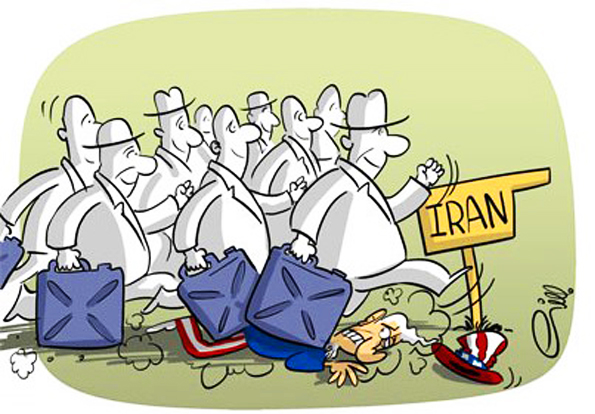US surprised by ‘Iranian evasion technique’


As sanctions mount against Iran, reports have gave an account of how surprised some US authorities are by Iran’s methods of bypassing the sanctions.
“Despite onerous sanctions that have basically shut Iran out of the global financial system, the country is still finding some ways to bypass them, the Treasury Department said Thursday, describing what it called a small but “emerging threat” to the effectiveness of the sanctions effort,” NY Times said in an article January 10.
“Adam Szubin, director of the Treasury’s Office of Foreign Assets Control, which supervises American enforcement of the sanctions, said the Iranians were using private exchange houses and trading companies in other countries, masking transactions with fake identities and relying on the paperless practice known as hawala, common in parts of the Middle East and Asia, in which money is transferred informally and often illegally through trustworthy couriers,” NY Times continued.
The report says that with only 300,000 barrels deficit in oil export (as opposed to the alleged one million barrel deficit), Iran is bypassing sanctions.
The report goes on to say that in 2011 the growth rate was 1.7 per cent, to slip down to -1 percent in 2012.
World Bank expects Iranian economy to come clean of the slump with a 0.6 per cent growth rate in 2013. A previous report had predicted the growth rate at -0.7
Based on the report it is expected that Iran’s current account balance will remain positive and the country’s GDP growth would be 7.6 per cent.
Following World Bank’s admittance to Iran finding new ways to bypass sanctions, a US Treasury official has also acknowledged that Iran evades sanctions and reduces sanction effects.
Mr. Szubin’s office issued an advisory on Thursday aimed at informing American financial institutions about what it called Iranian evasion techniques to circumvent the sanctions.
The most vexing sanctions, from Iran’s point of view, are financial banns that have blacklisted many Iranian banks, denied them access to international monetary and credit channels and severely restricted Iran’s ability to sell oil, the most important Iranian export. A new law signed by President Obama this month expands the sanctions to include shipping, shipbuilding and energy concerns, which are likely to hurt many Iranian industries, including construction, machinery and automaking.
In a conference call with reporters, Mr. Szubin described the sanctions as a large achievement that had left Iran “almost without recourse through ordinary banking channels.” At the same time, he said, “Iran is adapting.”
“Increasingly we’re seeing them turn to trading houses in third countries,” he said, “to facilitate movement of money that would ordinarily go through a bank.”
The practice of hawala, he said, is much more difficult to monitor and disrupt. “That said, hawalas are even less perfect substitutes for banks,” he said. “It’s a mechanism that only works if you have absolute trust of the individuals involved.”
Mr. Szubin declined to quantify the total amount of money he said Iran had amassed despite the sanctions. Nor would he identify the trading houses — or even the countries — where circumventions have been carried out, but said “we are pursuing a number of cases.”
He also said the transactions in question were often in the tens of thousands of dollars range and denominated in dollars, Euros, British pounds and yen. Larger sums, he said, would be more likely to attract attention.
He considered Iran’s techniques of escape as a threat to US and suggested the need for more effective policies.







